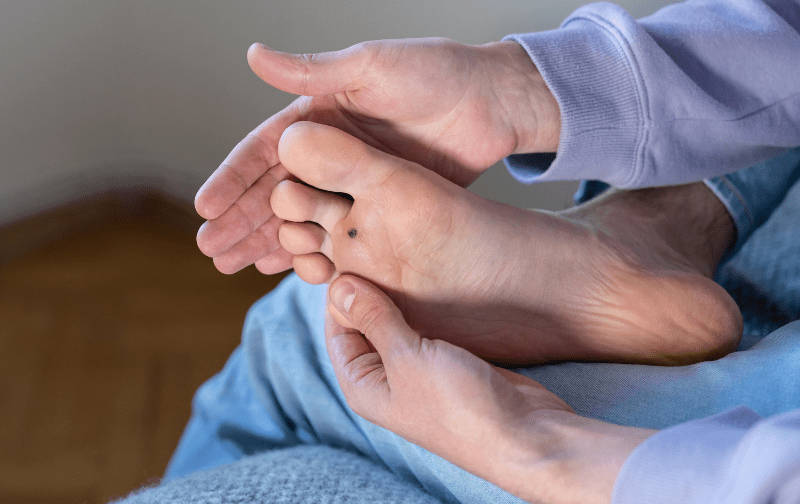Verruca treatment
At Poized Podiatry, we offer expert treatment for verrucae and warts to help you achieve healthier, pain-free feet. Verrucae, or plantar warts, are warts located on the feet caused by the Human Papilloma Virus (HPV). They often appear flattened due to the pressure from standing and walking and can be a persistent nuisance. With our range of advanced treatments, we aim to effectively eliminate these viral infections and restore comfort to your feet.

What to expect during verruca treatment?
During your verruca treatment, you’ll start with a comprehensive assessment by our skilled podiatrist, who will examine your verruca, review your medical history, and address any concerns. Based on this evaluation, your podiatrist will recommend the most suitable treatment method, such as caustic therapy (chemical application), or dry needling (localised trauma). Depending on the method chosen, you may experience brief discomfort, like a sharp sensation from freezing or a mild stinging from chemicals. After treatment, some minor discomfort or redness is normal, and your podiatrist will provide specific aftercare instructions, which may include keeping the area clean and dry or using protective coverings. Follow-up appointments will be scheduled to monitor your progress and adjust the treatment plan if necessary. As your verruca heals, you will receive guidance on foot hygiene and preventive measures to reduce the risk of recurrence. This thorough approach ensures effective treatment and supports your recovery, providing relief and helping to prevent future issues.
Initial assessment
Your podiatrist will conduct a thorough examination of your feet and discuss your medical history to diagnose the verruca and determine the most suitable treatment
Treatment plan
Based on the assessment, a personalised treatment plan will be developed
Treatment session
Depending on the chosen treatment, you may experience varying levels of discomfort. Caustic therapy uses a chemical solution to destroy the virus. Dry needling involves using a needle to stimulate an immune response
Post treatment care
After treatment, you may need to follow specific aftercare instructions to ensure optimal healing and prevent recurrence. Your podiatrist will provide guidance on managing any discomfort and caring for the treated area
Follow up appointments
Regular follow-ups may be necessary to monitor progress and determine if additional treatments are needed. Your podiatrist will schedule these appointments as part of your comprehensive care plan
Healing and prevention
As your verruca heals, you may notice the area gradually improving. Your podiatrist will offer advice on foot hygiene and preventive measures to avoid future infections and recurrence
FAQs
What are verrucae and how are they different from regular warts?
Verrucae are warts specifically located on the feet and are caused by the HPV virus. Unlike other warts, verrucae are flattened due to the pressure from walking and standing. They do not have roots; what seems like roots are actually tiny blood vessels.
How do I know if I have a verruca?
Verrucae typically have a rough, cauliflower-like appearance and may have small black dots, which are blood vessels. They usually cause discomfort when squeezed but not when pressed lightly. A podiatrist can provide a definitive diagnosis.
What treatments are available for verrucae?
We offer several treatment options including caustic therapy and dry needling. The choice of treatment depends on factors such as the verruca’s size, location, and your overall health.
Is verruca treatment painful?
Treatment methods vary in terms of discomfort. Cryotherapy and caustic therapy may cause temporary discomfort, while dry needling is performed under local anaesthetic to minimise pain. Your podiatrist will discuss pain management options with you.
How long does verruca treatment take?
The duration of treatment depends on the method used and the verruca’s severity. Most treatments take between 15 to 30 minutes, but multiple sessions may be required for complete resolution.
Can verrucae be prevented?
To reduce the risk of contracting verrucae, avoid walking barefoot in communal areas, use personal towels, and maintain good foot hygiene. If you have existing verrucae, seek prompt treatment to prevent spreading.
Our Services
Gait analysis
Our gait analysis examines your walking and running patterns to identify any abnormalities or imbalances that may be causing pain or discomfort.
MSK follow up appointment
After an advanced MSK assessment, we review progress, reassess and evaluate the effectiveness of your current treatment
Advanced musculoskeletal consultation
A comprehensive evaluation of your lower limbs to identify issues affecting movement or overall foot health
